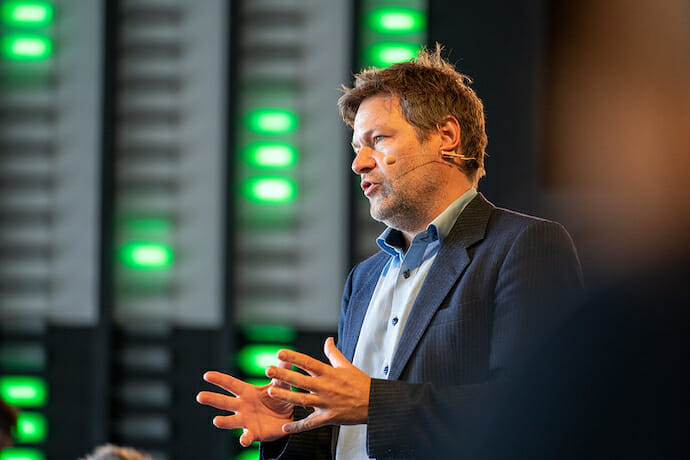
Germany’s Green Party has Some Growing Up to Do.
“Bra-burning feminists.” “Tree-hugging ecologists.” “Pacifist students detached from the real world.” All these criticisms have been levied against Green parties globally, yet they are historically not unfounded. For Germany’s Greens, these groups would be what would give birth to it—the generation of 1968’s protests cemented as a political party.
Whilst these movements themselves are often admirable, they weren’t mature movements. That much was reflected in their electoral performance. In Germany, this movement of movements would have its first real debut on 1.5% of the vote—far below the 5% threshold. It would linger in political prepubescence for a decade, having formed coalitions at the state level that would collapse quickly including one brought down by the Greens over their battle against nuclear energy. The reunified federal election of 1990 would reflect just that, with West Germany’s Greens thrown out partially as a result of their unrealistic belief that energy politics should be prioritized over reunification.
It would not be until Schroeder’s federal Red-Green coalition (Social Democrats and Greens) that a real, mature green party would develop in Germany. The need for intervention to prevent genocide in Kosovo would question the absolutist pacifism of so many members—as would the 2001 Afghan intervention. Indeed, four Green MPs would vote to topple their own government during, and as a result of, the Afghan intervention. The second Schroeder term with its neoliberal Hartz reforms would see the party’s Marxist-ecologist members depart (under heavy pressure from the party’s leadership).
This trend of radical members departing would only continue as the party normalised itself through a coalition with the Christian Democrats at a state level in 2008. The state-level manifesto agreed upon encapsulates their normalization almost perfectly—swapping new roads for more public transport and keeping coal plants for education reform. Their right was ascendant and as the Pirate Party popped up the final wave of departures of the anti-pragmatists like Angelika Beer would take place – cementing a pragmatic orientation. With generational replacement, the frankly gaffe-prone Greens that dominated the 1990s and 2000s (Künast and Trittin) would depart their positions of party leadership by the time of their more recent upsurge though admittedly current leader Annalena Baerbock certainly knows a thing or two about gaffes.

This is not a history article, despite how it may feel, this is the necessary contextualization under which today’s Greens must be viewed. Compare today’s German Green Party with a Green Party in most other countries—in America the Greens are still in their prepubescent stage, preferring to let in an Oil Billionaire in the form of George Bush and push whacky conspiracies about vaccines with 2016’s “Dr” Jill Stein. In the UK, the Greens are at least beginning to experience maturation cooperating with the Liberal Democrats in the 2019 election and softcore cooperation with the Conservatives on some local councils (certainly a sharp change from their 2014/2015 campaigns which relied on demonizing cooperation and painting all other parties as the same).
The current German Greens are now so comfortable with reality, much to the chagrin of the socialist Die Linke which has labeled the Greens a bourgeois party, that Winfried Kretschmann, Green Minister-President of Baden-Württemberg, is able to label himself a conservative—something which would have been unthinkable to many of the 1980s Greens who split into two as conservative-ecologists split off to form the right-leaning Ecological Democratic Party.
They are now almost Bidenistic in their branding of often radical policies as sensible, common sense heartland policies, not least their de facto carbon-mitigation transfer union. Bavaria’s Green triumph in 2018 (which kicked off their current surge) was sold with a clean homeland for all playing into that state’s idea of fusing tradition and modernity (‘Laptop and Lederhosen’).
Yet what amounts to radical policies (the transfer union and incredibly low thresholded wealth tax) are really rather rare. Take, for instance, their coal phase-out. A phase-out by 2030? Britain will have done its own by 2025 at the very latest (and could frankly do it near-immediately now). Getting rid of non-zero emission cars after 2030? Again Britain is doing much the same. Reforming the debt brake? Find me one Republican Congressperson who genuinely cares as much about the Greens do about the deficit – who even after their debt brake reform will still ensure debt as a % of GDP reduces every normal year. Nearly all of their policies amount fundamentally to tweakages—marginally raising the top rate of income tax to fund pollution mitigation; the green new deal it ain’t.
Indeed, for an international audience regardless of political perspective, there is much to be applauded in their manifesto – whilst maintaining a neo-pacifistic approach overall, they provide opposition to Nord Stream 2 on the basis of energy sovereignty, support a Swedish style feminist-foreign policy, or what Americans might term the Hillarydoctrine, and an approach that puts human rights particularly those of persecuted minorities such as Uyghurs at the forefront of the agenda. They are not afraid to call out human rights abuses and with the most likely coalition looking to be a Black-Green one (Christian Democrats and Greens), the foreign policy potential that combines European sovereignty, human rights, and a recommitment to the transatlantic military-security infrastructure has the potential to make Germany a humanitarian (and to a much lesser extent military) superpower.
The party is now older than its Chancellor candidate. But whilst both are young in comparison to Germany’s dominant parties and politicians, they are mature beyond their years. They have, like the other Green parties of central Europe, learned the key message: that a smart Green party is one that rejects ‘watermelonism’ (a red socialist fruit wrapped in a green ecological skin). The recent “scandal” over bonus payments to the party Chancellor candidate Annalena Baerbock for strong electoral successes appropriates this message completely. Who would ever have guessed that a movement made for and by the children of ‘68 would morph into the pragmatists of 2021? For our planet’s sake, it’s a shame that this metamorphosis hasn’t been replicated by Greens elsewhere.

